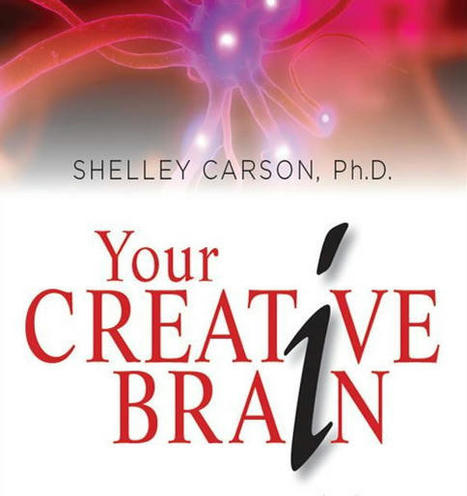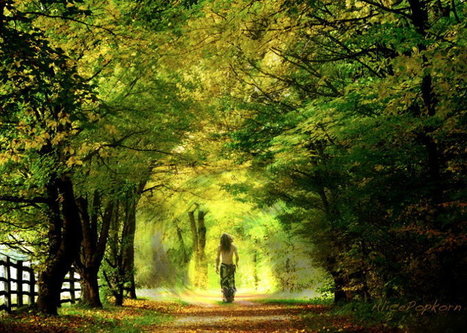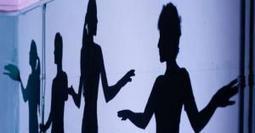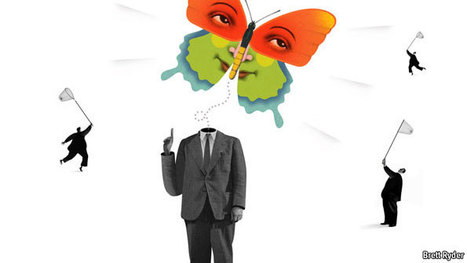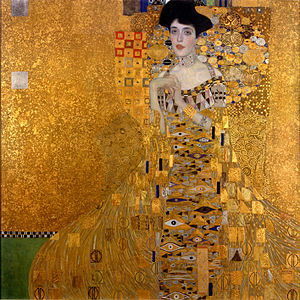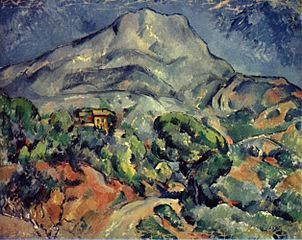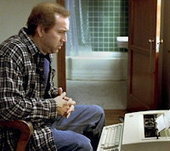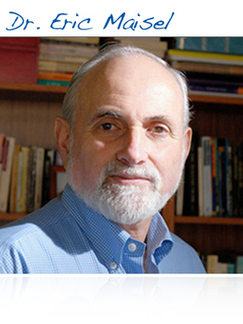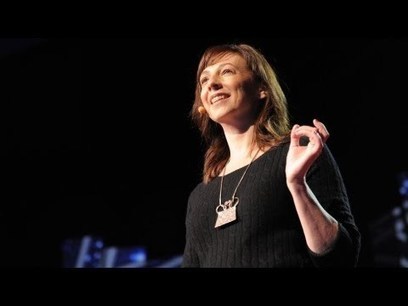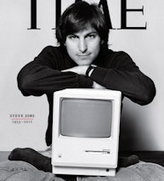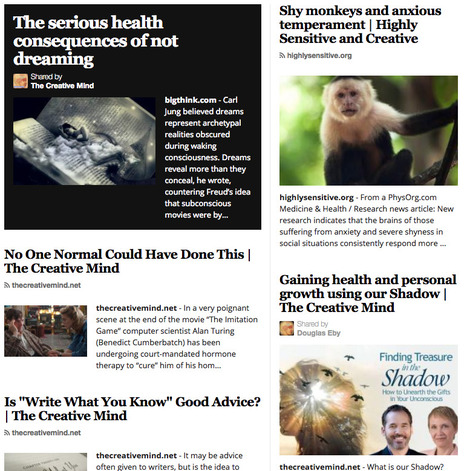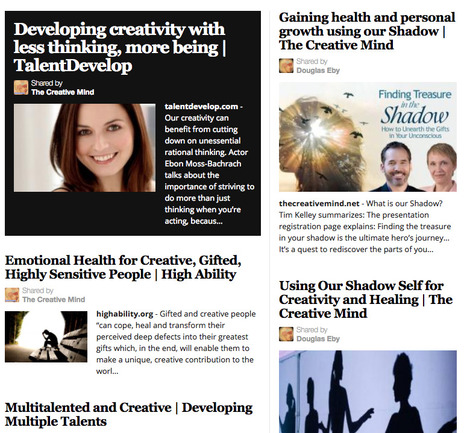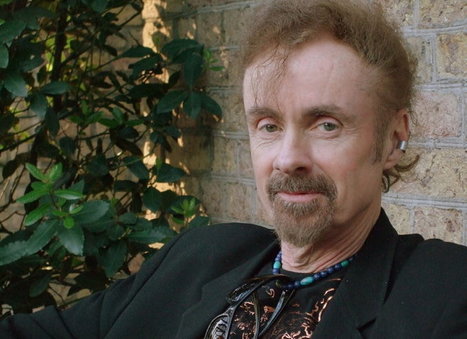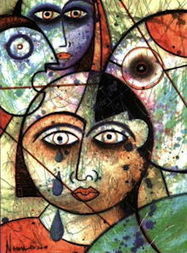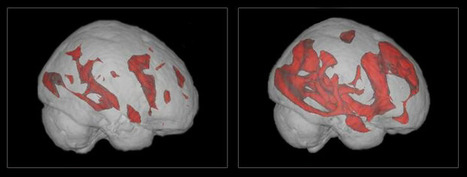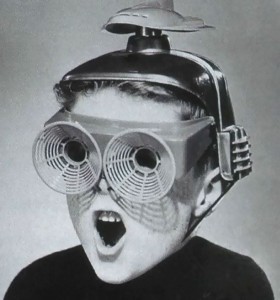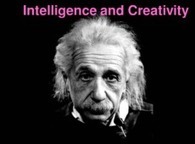 Your new post is loading...
 Your new post is loading...

|
Scooped by
Douglas Eby
|
Topics in our interview relate to the creative mind and developing creativity, including the seven brain activation patterns she discusses in her book.

|
Scooped by
Douglas Eby
|
Cheryl Arutt, Psy.D., a clinical psychologist specializing in creative artist issues, writes: “I am continually amazed at the work of the unconscious in the minds of creative artists. "The capacity to hold many details in the conscious, wakeful mind may seem limited; the unconscious is capable of holding far more.

|
Scooped by
Douglas Eby
|
The Creative Mind Daily for March 12 includes: Creating To Maintain Meaning; Mark Matousek on Writing for Health and Transformation; Using Our Shadow Self for Creativity and Healing | etc

|
Scooped by
Douglas Eby
|
“My psyche’s fight, my whole life, has been the head against the heart.” Jodie Foster
Another famous INTJ: Isaac Asimov. He has commented: “[People think] a scientist is cold… and uses only his reason; he argues carefully step by step, and needs no imagination. That is all wrong… The true scientist is quite imaginative as well as rational..."

|
Scooped by
Douglas Eby
|
Developing Creativity newsletter Sep 15 - *Work-Life-Creative Balance video; *Self-Esteem video; *Facebook Community for Introverted Artists; *Books to fuel creation - and more

|
Scooped by
Douglas Eby
|
Creativity researcher Mihaly Csikszentmihalyi says, “If there is one word that makes creative people different from others, it is the word complexity. “Like the color white that includes all colors, they tend to bring together the entire range of human possibilities within themselves. Creativity allows for paradox, light, shadow, inconsistency, even chaos – and creative people experience both extremes with equal intensity.”

|
Scooped by
Douglas Eby
|
Why business needs people with Asperger’s syndrome, attention-deficit disorder and dyslexia. - IN 1956 William Whyte argued in his bestseller, “The Organisation Man”, that companies were so in love with “well-rounded” executives that they fought a “fight against genius”. Today many suffer from the opposite prejudice. Software firms gobble up anti-social geeks. Hollywood bends over backwards to accommodate the whims of creatives. Unlike the school playground, the marketplace is kind to misfits. Recruiters have noticed that the mental qualities that make a good computer programmer resemble those that might get you diagnosed with Asperger’s syndrome ~~~ Related: Brain Differences and Creativity http://talentdevelop.com/4731/brain-differences-and-creativity/

|
Scooped by
Douglas Eby
|
There is growing support for the creative value of mentally stepping away from our work for a while, and not being so captivated by only consciousness. Neuropsychologist Eric Kandel writes, “When we take the wrong approach to a problem, which happens often, we get nowhere by continuing to think about it. But if we refrain from thinking about the problem and distract ourselves… [we] transition from a rigid, convergent perspective to an associative, divergent perspective.”

|
Scooped by
Douglas Eby
|
Visual spatial learners are more likely to be a late bloomer, as well as creatively, mechanically, emotionally, or technologically gifted. Lesley Sword (of Gifted and Creative Services Australia) explains, “Temporal, sequential and analytic functions are thought to be associated with the left hemisphere of the brain. In contrast, spatial thinking involves synthesis, an intuitive grasp of complex systems, (often missing the steps) simultaneous processing of concepts, inductive reasoning (from the whole to the parts), use of imagination and generation of ideas by combining existing facts in new ways (creative thinking)."

|
Scooped by
Douglas Eby
|
"Only a small percentage of creative people work as often or deeply as they might be expected to. What stops them? Anxiety or some face of anxiety." Therapist and creativity coach Eric Maisel, PhD. also notes, “There are many different kinds of anxiety reactions. Sometimes anxiety manifests itself as confusion and a weakness of mind and body. Sometimes it manifests as persistent worry.”

|
Scooped by
Douglas Eby
|
Your Best Life in the Arts with Dr. Eric Maisel - In this 14-week class you will work directly with America’s foremost creativity coach. Who Should Attend? Fiction writers, memoirists, poets and nonfictions writers (including professionals contemplating writing a book); visual artists; performers; composers; stage and screen professionals; craftspeople; individuals wanting to create more deeply and more regularly; blocked creatives; people who’ve abandoned the arts and want to return; coaches, therapists, and other professionals who want to learn about the challenges of the creative life; and anyone interested in the creative life. Learn more at the program site http://talentdevelop.com/YBLITA

|
Scooped by
Douglas Eby
|
In a culture where being social and outgoing are prized above all else, it can be difficult, even shameful, to be an introvert. But, as Susan Cain argues in this passionate talk, introverts bring extraordinary talents and abilities to the world, and should be encouraged and celebrated. Related:
Susan Cain notes Bill Gates is an introvert, but not shy, and Barbra Streisand, who famously suffers from stage fright, is a shy extrovert. Cain notes, “Shyness and introversion are not the same thing. Shyness is the fear of negative judgment, and introversion is a preference for quiet, minimally stimulating environments. - From my post Creative Introverts
http://blogs.psychcentral.com/creative-mind/2011/07/creative-introverts/ In her NYTimes article, Cain writes, "Solitude is out of fashion. Our companies, our schools and our culture are in thrall to an idea I call the New Groupthink, which holds that creativity and achievement come from an oddly gregarious place…But there’s a problem with this view. Research strongly suggests that people are more creative when they enjoy privacy and freedom from interruption." -From my post Developing Creativity in Solitude
http://blogs.psychcentral.com/creative-mind/2012/01/developing-creativity-in-solitude/

|
Scooped by
Douglas Eby
|
The Innovator's DNA book includes skills you can make use of being a disruptive innovator as an individual creator, as well as a business leader. One of the skills: "Associating refers to your ability to make connections across seemingly unrelated questions, problems, fields of study, or ideas. Associational thinkers draw on knowledge acquired through questioning, observing, experimenting and networking to link together unexpected combinations of problems, ideas and observations to produce new business ideas."
|

|
Scooped by
Douglas Eby
|
The Creative Mind Daily for March 27 includes: * The serious health consequences of not dreaming * Shy monkeys and anxious temperament * No One Normal Could Have Done This | etc.

|
Scooped by
Douglas Eby
|
The Creative Mind Daily for March 16 includes: * Gaining health and personal growth using our Shadow; * Developing creativity with less thinking, more being; * Multitalented and Creative | etc

|
Scooped by
Douglas Eby
|
How does being ambitious impact creative people? How does it drive creative work? Jane Piirto notes “Ambition and its doppelganger, envy, are not unknown among writers…For example, writer T. C. Boyle said he wanted to be ‘the most famous writer alive and the greatest writer ever.’”

|
Scooped by
Douglas Eby
|
Developing Creativity newsletter : Chaos and Creative Expression; Nurturing Self-Esteem; Challenged By Being So Smart; much more.

|
Scooped by
Douglas Eby
|
Do you remember how much you felt and thought as a child? Probably a lot, especially if you were gifted and creative. As an adult, we may have learned to cover up or set aside much of our inner life, in order to get along with others and do our jobs. But if we want to be more fully alive and creative, it can really help to understand and stay in charge of our thinking and feelings.

|
Scooped by
Douglas Eby
|
UCLA scientists have found that for computer-savvy middle-aged and older adults, searching the Internet triggers key centers in the brain that control decision-making and complex reasoning. The findings demonstrate that Web search activity may help stimulate and possibly improve brain function. The study, the first of its kind to assess the impact of Internet searching on brain performance, is currently in press at the American Journal of Geriatric Psychiatry and will appear in an upcoming issue. Additional details on the study and further research on the impact of computer technologies on the aging brain are highlighted in Small's book, "iBrain: Surviving the Technological Alteration of the Modern Mind". http://vsb.li/73nopw

|
Scooped by
Douglas Eby
|
By David Dobbs - My post two days ago on the links between depression and creativity sparked some smart comments. Perhaps the best was sent to me privately by the excellent blogger The NeuroCritic, and I am highlighting it in its own post here, with The Neurocritic’s permission, because it makes a an important point that I failed to note in the original piece: These links between madness and creativity don’t make the more severe manifestations of depression or bipolar disorder any less destructive or painful. ~~ One of many related TalentDevelop posts: Rethinking Creativity and Depression http://depressionandcreativity.org/139/rethinking-creativity-and-depression/
There is growing support for the creative value of mentally stepping away from our work for a while, and not being so captivated by only consciousness. Neuropsychologist Eric Kandel writes, “When we take the wrong approach to a problem, which happens often, we get nowhere by continuing to think about it. But if we refrain from thinking about the problem and distract ourselves… [we] transition from a rigid, convergent perspective to an associative, divergent perspective.”

|
Scooped by
Douglas Eby
|
Why do smart and manic so often go together? By Eric Maisel, Ph.D.... "Mania can hit anyone, since it can be induced by street drugs and by other causes as well as by the dynamics of one’s own racing, needy brain. But I want to focus on the way that it afflicts intelligent and creative people." ~~~ Image from post: Creativity Higher with Bipolar? By Douglas Eby. http://blogs.psychcentral.com/creative-mind/2010/12/creativity-higher-with-bipolar/ ~~~ > Related book: Rethinking Depression: How to Shed Mental Health Labels and Create Personal Meaning, by Eric Maisel, PhD.
http://goo.gl/J77pc

|
Scooped by
Douglas Eby
|

|
Scooped by
Douglas Eby
|
Article by Scott Barry Kaufman, Ph.D. Creative people think differently. But why? There is no magic bullet or single pill. We all have the potential for creativity, but there are so many different triggers that can broaden our minds, inspire, and motivate. Of course, there are just as many triggers that can shut down our minds. Since creativity is so important for individual well-being and societal innovation, it’s important that we systematically pull the right triggers. ~~~ More perspectives of Kaufman in my post: Scott Barry Kaufman on Kick-starting Your Creativity http://blogs.psychcentral.com/creative-mind/2012/03/scott-barry-kaufman-on-kick-starting-your-creativity/

|
Scooped by
Douglas Eby
|
Creativity and Intelligence as opponent processes. By Sandeep Gautam... Creativity and Intelligence are related, but also opposed to each other in a certain way. Traditional analysis of relations between intelligence and creativity have focussed on whether one is a subset of the other; whether they are correlated and found significantly more often together than by themselves; and whether one (high IQ) is a necessary condition or prerequisite for the other (creativity) - the threshold theory of creativity. ~~~ Related: More Intelligence, More Creative? http://blogs.psychcentral.com/creative-mind/2012/01/more-intelligence-more-creative/
|
 Your new post is loading...
Your new post is loading...
 Your new post is loading...
Your new post is loading...





